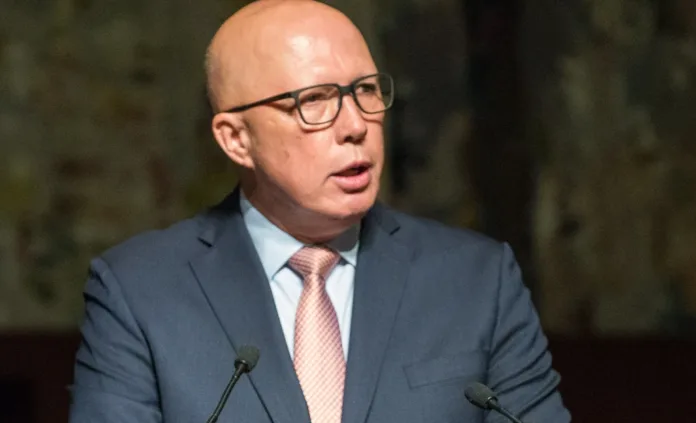Peter Dutton pledges a 15% gas price cut and cheaper power as he targets Albanese’s energy record
Opposition leader Peter Dutton has vowed to slash energy bills across Australia with a bold new national gas plan, describing the policy as a “game changer” during the first leaders’ debate of the election campaign.
Unveiling long-awaited economic modelling on Tuesday night, the Coalition revealed its plan to force gas companies to keep more of their product in the domestic market. The strategy, Dutton claims, will deliver immediate and lasting relief to families and businesses grappling with soaring energy costs.
Under the policy, Australian households would see gas bills fall by 7 per cent and electricity bills drop by 3 per cent. Industrial users, who have long complained about inflated gas prices, are forecast to enjoy a 15 per cent cut to their retail gas bills, while wholesale electricity prices could tumble by 8 per cent.
Speaking in front of a screen bearing the Coalition’s campaign slogan “Let’s get Australia back on track,” Dutton went on the offensive, accusing Prime Minister Anthony Albanese of breaking his election promise to cut power bills by $275. He argued Labor had failed to deliver on cost-of-living relief, especially in the energy sector.
“Our policy will be a game changer,” Dutton said. “We can then see the cost and therefore price of electricity, construction, food prices and many other goods start to come down. Gas is critical to our nation’s energy future.”
The plan hinges on the concept of gas reservation—requiring producers to set aside a portion of their output for domestic use rather than selling it on the more lucrative global market. According to Danny Price, managing director of Frontier Economics, which prepared the modelling, the policy would help decouple local gas prices from expensive international rates.
Embed from Getty Images“This puts a firewall between Australians and volatile global markets,” Price explained. “By prioritising local supply, the Coalition’s policy promises real reductions for households and industrial users.”
The modelling was released in real-time during the first leaders’ debate, which saw Dutton and Albanese spar over energy, healthcare and migration. Albanese was narrowly judged the winner by a panel of 100 undecided voters, though 20 per cent of them remained on the fence.
Energy policy loomed large during the debate, reflecting mounting voter anxiety over rising power bills. While Labor has focused heavily on renewable energy infrastructure, Dutton’s pivot to gas positions the Coalition as a champion of reliability and affordability, particularly for manufacturing-heavy states.
But the plan is not without its critics. Some environmental groups warn that prioritising gas could entrench fossil fuel dependence and undermine climate targets. Others argue that without strong regulatory enforcement, gas companies may find ways to sidestep the reservation requirements.
Outside the energy arena, political tensions flared as Independent Senator Jacqui Lambie and former senator Rex Patrick called for a sweeping inquiry into Australia’s alliance with the United States. The proposed parliamentary probe would scrutinise the ANZUS Treaty and the AUKUS agreement that has promised Australia a fleet of nuclear-powered submarines.
“We need to ask the hard questions,” Lambie said. “The US is putting America first—it’s time we put Australia first.”
With the election campaign gathering momentum, cost-of-living pressures remain front and centre. Dutton’s gas policy is designed to seize that narrative and drive a wedge between Labor’s climate credentials and everyday affordability. Whether voters buy it will become clear at the ballot box.
